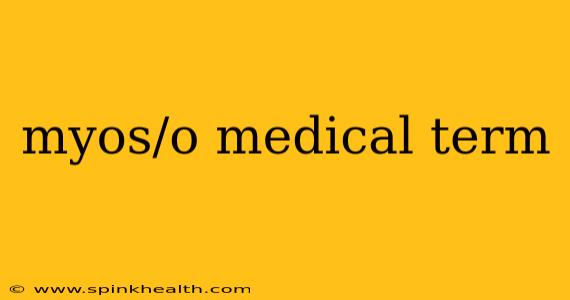Decoding the Medical Term: Myos/o - Your Journey into Muscle Anatomy
Have you ever encountered the term "myos/o" in a medical context and found yourself scratching your head? Don't worry, you're not alone! This seemingly cryptic combination of letters actually holds a significant key to understanding the human body. Let's embark on a journey to unravel the mysteries behind this fascinating medical term and explore its various applications.
Myos/o, simply put, is a combining form in medical terminology. It refers to muscle. Imagine it as a building block, a prefix that attaches to other words to create specific medical terms related to muscles. Think of it as a secret code, where "myos/o" is the key to unlocking a world of muscle-related knowledge.
What does myos/o mean in medical terms?
As we've established, myos/o signifies "muscle." This seemingly simple definition opens doors to a vast landscape of medical terminology. By understanding this root, you can quickly decipher many complex medical words. For example, "myositis" combines "myos/o" (muscle) with "-itis" (inflammation), resulting in the term for muscle inflammation. This understanding allows medical professionals and students alike to efficiently process and comprehend medical information.
What are some words that start with myos/o?
Let's delve into some common medical terms incorporating "myos/o" to solidify our understanding:
- Myalgia: This term, combining "myos/o" and "-algia" (pain), refers to muscle pain. We've all experienced myalgia, that nagging ache after a particularly strenuous workout or a long day at the office.
- Myositis: As mentioned earlier, this term indicates muscle inflammation. Various conditions can cause myositis, ranging from viral infections to autoimmune diseases.
- Myocardium: This word combines "myos/o" with "cardium" (heart), referring to the muscular tissue of the heart. Understanding the myocardium is crucial in comprehending cardiovascular health.
- Myoma: This term, incorporating "myos/o" and "-oma" (tumor), refers to a benign tumor of muscle tissue.
- Myopathy: This combines "myos/o" with "-pathy" (disease), referring to any disease of the muscles. This is a broad term encompassing various conditions affecting muscle function and structure.
What are some other combining forms related to muscles?
While "myos/o" is a prominent combining form, it's not the only one used to describe muscle-related aspects. Understanding other related terms enhances our comprehension of medical vocabulary:
- Muscul/o: This combining form is a more straightforward term for muscle, often used interchangeably with myos/o.
- Sarc/o: This combining form refers to flesh or muscle, often seen in terms like "sarcoma," indicating a cancer of connective tissue, which includes muscle.
How is the term myos/o used in medical practice?
The term "myos/o" is not just a theoretical concept relegated to textbooks. It plays a critical role in daily medical practice. Doctors use these terms for accurate diagnoses, treatment planning, and clear communication with patients and other healthcare professionals. Accurate medical terminology ensures that everyone is on the same page, leading to better patient care.
Understanding medical terminology, particularly combining forms like "myos/o," empowers individuals to become more active participants in their healthcare. Armed with this knowledge, you can engage in more informed conversations with your healthcare provider, leading to better health outcomes. So, the next time you encounter "myos/o" in a medical context, remember this journey and the profound meaning it carries.

